Like a Chinese Tattoo / Cullen Bunn, Rick R. Reed, David Thomas Lord, and JA Konrath
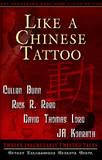 Dark Arts Books / March 2008
Dark Arts Books / March 2008
Reviewed by: Vince A. Liaguno
Dark Arts Books is on a mission. That mission: to expose the horror masses to the many unsung literary voices that populate the genre. Following 2006’s Candy in the Dumpster, last year’s Waiting for October, and this year’s earlier Sins of the Sirens collections, Like a Chinese Tattoo is the innovative publisher’s latest conduit through which it intends to spread the good word. Like DAB’s previous collections, Tattoo features four very different voices – Cullen Bunn, Rick R. Reed, David Thomas Lord, and JA Konrath – and held loosely together by the nonspecific theme of “inscrutably twisted.” Indeed, several of the tales here preclude scrutiny by virtue of their sheer audaciousness.
Cullen Bunn kicks off the collection with the competent “Tomorrow, When Demons Come,” a story about lust and devotion, personified human emotions, and a particularly sinister Korean bathhouse where troubles and inhumanity are washed away for twenty dollars. “Remains” is a marvelous tale, at once chilling and heartbreaking, told from the POV of a teenage boy whose suspicions about the mysterious stranger who comes to work on his family’s farm come to tragic fruition. Bunn shows real talent here, capturing that period between adolescence and manhood with genuine authenticity. He deftly maneuvers between the horror and humanity of the story in a style reminiscent of early Stephen King (think It or “The Body”) and imbues the story with a deep emotional resonance that never detracts from the horror yet stays with the reader long after the last word. To follow the praiseworthy “Remains” with “Granny Kisses,” then, is like watching a double-bill of Stand by Me and American Pie. Crude and nasty, “Granny Kisses” is the literary equivalent of toilet humor taken to the unimaginable extreme – and this will be either high praise or scathing criticism depending on your own reading tastes. For this reviewer, the story detracts from Bunn’s obvious talent and comes off as a mere shock tactic. Herein lies both the beauty and Achilles’ heel of collections like this: showcase an author’s diversity and range at the peril of the reader walking away without a clear idea of the author’s true voice. Is Bunn a serious writer letting off some steam with “Granny Kisses” – or he is a literary shockmeister who had a fluke with “Remains”? Hard to tell, but I’m betting on the former with fingers tightly crossed.
Fortunately, I’m familiar with Rick Reed’s work because, again, his contributions here range from the ingenious to the inane. “Purfleet” is an inventive take on a horror staple that involves a wife on the run from a seemingly abusive husband who takes refuge in a psychiatric hospital. But all is not as it seems and Reed pulls out a whopper of a twist in the end that will leave Bram Stoker enthusiasts smiling from ear to ear. Likewise, “Moving Toward the Light” is a capable revenge tale first published in The Crow: Shattered Lives and Broken Dreams in 1998. Gritty and not for the faint-of-heart, Reed’s story of one young woman hitting rock bottom and the otherworldly forces that avenge her brutal rape and beating in order to build her up again is one of hope and redemption in the midst of hopelessness. Astute Reed fans will instantly recognize this as a sequel of sorts to his 1992 novel Penance (Dell), about a serial killer preying on child prostitutes on the streets of Chicago. Although Reed’s third contribution mines the same juvenile humor of Bunn’s “Granny Kisses,” there is at least a recognizable plot. “Stung” is part of the ongoing misadventures of a recurring character from Reed’s fictional stable named Amelia. Here readers find the overweight, socially awkward heroine joining a company getaway at her employer’s summer home. Joined by her nagging, shrewish mother, Amelia runs characteristically afoul of trouble – found here in the form of a wasp that stings her in the rectum. Ample bathroom gags abound, with flatulence and clogged bowels meeting KY jelly and a well-placed toilet plunger. You do the math.
If the first two author showcases leave you feeling a bit uneven, David Thomas Lord knows how to straddle the line between literary and lighthearted without losing his voice. He starts off strong with the previously published “The White Room,” a visual treat of color and monotony in which white takes center stage and reveals the true colors of madness. “The Great White Ape” is the standout story of the entire collection, and Lord crafts a remarkable tale of bait and switch…of spider luring the fly to its web… that has the timeless feel of a classic. Part travelogue, part period piece, “The Great White Ape” reads like an enthralling adventure epic, morality play, and cautionary tale all rolled into one – Gulliver’s Travels meets The African Queen meets At Play in the Fields of the Lord. Some underlying eroticism helps imbue the story with its constant sense of low-lying tension as Lord moves the story to its heartrending conclusion. “Da’s Boy” - Lord’s literary quickie here - wisely circumvents the bawdry humor of Bunn’s and Reed’s stories and opts for more gallows humor in this dialect-heavy tale of a tragic bond between grandson and grandfather.
Mystery scribe JA Konrath was an adventurous choice to round out the anthology’s quartet, and Dark Arts should be commended for such an inspired choice. The three Konrath stories included here are a fine introduction to an author who can pull off experimental (as in “The Confession” which is told entirely through dialogue), black comedy (as in “The Necro File,” a bold crime noir/horror parody that’s Scary Movie meets The Naked Gun), and deceptive (as in the seemingly straightforward torture/revenge tale “Punishment,” which kicks the legs out from under the table in the last paragraphs). Konrath demonstrates that irreverent humor need not be gratuitous to be effective, using the mundane events of everyday life as fodder for his sharp wit, as in this passage from “The Necro File”:
Next, I checked my email, where I discovered I’d won the Irish lottery, inherited eighty million dollars from an unknown relative, and was asked to shuffle funds into my bank account from the President of Rwanda. They all got my standard response: enthusiastic replies with an attachment supposedly containing my routing number. The attachment really contained an email bomb, which once opened would bombard their computers with tens of thousands of naked pictures of actress Bea Arthur. I called it the Maude Virus.
Bill Breedlove waxes nostalgic in his introduction to Like a Chinese Tattoo about discovering Alfred Hitchcock’s Monster Museum in the library as a kid and the hunger that collection set off for him, satiated only by devouring other like tomes. Along the way, he was introduced to the voices that would gradually form his own primary literary interests. He uses this formidable childhood experience to espouse the virtues of the anthology format, making the case that for a limited commitment in terms of time, money, and patience, the rewards to readers are immense. His point is well-taken with Like a Chinese Tattoo. With superb standouts like David Thomas Lord’s “The Great White Ape” and Cullen Bunn’s “Remains” overshadowing the few questionable misfires here, Tattoo yields large returns for those willing to invest a little patience. Like literary tapas, the stories in Like a Chinese Tattoo offer a small taste of some big talent. Another noteworthy addition to the impressive (and growing) Dark Arts catalog.
Purchase Like a Chinese Tattoo with stories by Cullen Bunn, Rick R. Reed, David Thomas Lord, and JA Konrath.
Seldom Seen In August / Kealan Patrick Burke
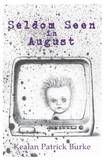 White Noise Press / April 2008
White Noise Press / April 2008
Reviewed by: Blu Gilliand
Seldom Seen In August opens like a straight-up crime drama: Wade Crawford is on the run, ducking the police after a bank robbery gone bad, trying to lose himself in a maze of typical suburban houses while sirens wail in the distance. His partner is running, too, only he went in the other direction, and has all their money in his hands.
Things aren’t looking good for Wade. And they’re about to start looking a whole lot worse.
He picks a house out of the generic neighborhood lineup and breaks in. The place seems empty, but Wade, ever the deliberate criminal, begins a room-by-room search, wanting to be sure he’s alone before relaxing long enough to plan his next move.
He’s not alone. There’s a boy with a straight razor, for one thing, and many more surprises are lurking in the shadows.
To really get a feel for the ride Burke takes you on in this 39-page novella, beautifully designed and illustrated by White Noise Press chief Keith Minnion, picture him behind the wheel of your getaway car. Just when you feel like he’s settled on a direction, he wrenches the wheel to the left, sending the car screaming into Twilight Zone territory. One hard right later and you’re bound straight for science fiction. But like any expert driver, Burke may look like he’s seconds away from a fatal crash, but he’s in complete control. He’s going to get you where you’re going – a little bumped and bruised, a little out of breath, but exhilarated all the same.
Seldom Seen In August showcases Burke’s continued growth as a writer. With every published piece, the characterizations get sharper, the themes become more complex, and the voice becomes more distinct. Burke continues to push the boundaries of his own fiction, showing more of his influences even as he refines his own style. With this short, powerful story, readers can continue to see where investment in the early stages of this writer’s career are going to pay dividends for some time to come.
The softcover edition of Seldom Seen In August is sold out. For more information on White Noise Press’ forthcoming lettered hardcover edition of this novella, click here.
The Devil's Footprints / Amanda Stevens
 MIRA Books / March 2008
MIRA Books / March 2008
Reviewed by: Vince A. Liaguno
Thriller writer Amanda Stevens - who branched out from a successful line of Harlequin Intrigue romantic suspense novels with last year’s creepy The Dollmaker - makes a welcome return to bookshelves with The Devil’s Footprints.
Sarah DeLaune is a New Orleans tattoo artist haunted by the unsolved murder of her sister, Rachel, fourteen years ago. Although she has always believed the murderer to be one Ashe Cain, a secret childhood friend who appeared only to the troubled teenaged Sarah and who conveniently disappeared on the night of the gruesome murder, a string of present-day homicides has the past (literally) bleeding into the present. Reluctantly, Sarah agrees to examine the crime scenes at the bequest of her ex-boyfriend, Lieutenant Sean Kelton, since the bodies are mysteriously tattooed post-mortem. But when a telltale sign from the past is found at the murder scenes, the similarities to Rachel’s killing make Sarah quickly realize that the murderer has returned to finish some unfinished business.
Stevens imbues Footprints with the same tight plotting that made Dollmaker so suspenseful a read, and adds an ensemble cast chock full of red herrings to skillfully up the mystery quotient. She ably takes on a flawed heroine in Sarah, who is so paralyzed by the uncertainties of her past that she finds herself sleepwalking through life - reliant on prescription medication and unable to maintain a serious relationship. Indeed, deft characterization is one of Stevens’ strong suits, as she ably proves in even the most peripheral of characters. Take, for example, this concise character sketch of Dr. Frank Canard, Orleans Parish coroner:
He was tall, wiry and grizzled, a once ruggedly handsome man with the nose and dogged determination of a prize fighter and the dignified demeanor of old Southern gentry. Even up to his elbows in blood and gore, he never lost that air of elegance and refinement that made him at home in some of the most fashionable salons in the state.
Stevens also adds a bit of the supernatural to the proceedings, with an urban legend dating back to 1922 when greedy oil drillers allegedly punched a hole (literally) straight down to hell and unleashed the devil himself who made his presence known with cloven footprints tattooed across the Arkansas farm near where the ill-fated DeLaune family would settle seventy years later. The author wisely keeps this element in check, more background music used to set a mood than an actual plot device, and the reader is never led to believe that the murders are the devil’s work in any literal sense.
With a narrative that’s gradually pulled tighter and tighter like a rubber band stretched to its limits, The Devil’s Footprints will thrill with its breakneck pacing, chill with its bloodcurdling undertones, and surprise with its finale twist.
Purchase Amanda Stevens’ The Devil’s Footprints.
Watch the Book Trailer here.
The Bitchfight / Michael A. Arnzen
 Bad Moon Books / February 2008
Bad Moon Books / February 2008
Reviewed by: Jeff Burk
Bad Moon Books has released yet another memorable, if not confounding, tale. I'm not sure whether to fall over in a fit of giggles or sit crying in the shower after reading The Bitchfight by four-time Bram Stoker Award winner Michael A. Arnzen. Child abuse, the mob, bestiality, and a very sick sense of humor await those twisted enough to venture into this short novelette.
A veterinarian in debt to the mob is called upon to make a very unusual house call. The animal in question is a little girl who acts like a dog, complete with barking and walking on all fours. To make matters worse, the vet is expected to stay and provide medical assistance for that evening's "dog-fights," a savage event where similar children will maim and gouge for a cheering, gambling crowd.
Clocking in at a mere 14,000 words, Arnzen wastes no time plunging the reader into a world of sickness and never lets up. There are no great metaphors at work here, no insight into the human condition, just shock and horror. Each turn of the page presents a new perversity. It may be for the best that the story is so short.
Some readers may be put off by how far Arnzen stretches the plot here, and not just in terms of violence and gore. While the story starts out believable enough, it abruptly veers into the realm of the fantastic. Readers who prefer their horror reality-based are cautioned: While the story sounds like a gritty, realistic tale, its tone is too light-hearted and the events too absurd to be taken in earnest.
For those looking for something completely different in their horror fiction, Michael A. Arnzen has the perfect little story for you. Take one part splatter, one part mob tale, add a dash of sex and violence, and throw in a whole lot of weirdness, and one has The Bitchfight. Recommended only for those with a strong stomach and an open mind; everyone else may feel some extreme discomfort. You have been warned.
Purchase Michael A. Arnzen’s The Bitchfight.
Calumet City / Charlie Newton
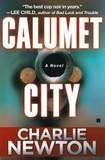 Touchstone (Simon & Schuster) / March 2008
Touchstone (Simon & Schuster) / March 2008
Reviewed by: Martel Sardina
Calumet City harbors secrets that Officer Patti Black has spent the last twenty odd years of her life trying to forget. Officer Black is the most decorated cop in Chicago and that’s what she’d like to focus on. While she is still haunted by her past, that doesn’t mean she’s looking for a reason to go dredging things up.
Unfortunately, life has a way of making you deal with the things you’d rather hide from. A series of crimes occur, all seemingly unrelated. How could an attempt on the mayor’s life, a drug bust gone bad, a murder and the discovery of a long-dead corpse all have something to do with one of the most respected cops in the Chicago Police Department’s history?
Patti Black knows. All the roads lead back to Calumet City, a place she thought she’d never have to go again. She can’t hide from her past any longer. But will the people who know, love and respect Officer Black still feel the same way once they learn the truth?
Calumet City is Charlie Newton’s debut novel. Newton packs nonstop action into a modern noir setting. Officer Black’s reaction to the obstacles she faces makes the suspense character-driven. The reader is often left feeling raw and scared as Officer Black is forced to confront her demons.
Part of Newton’s research included riding along with the real-life street cop Patti Black. While Newton maintains that this is a work of fiction, he also states “the true story of her life is both better and worse. And someday, she’ll tell it.” If the fictional version is any indication of what’s to come, then that’s one memoir this reviewer is looking forward to reading.
Purchase Charlie Newton’s Calumet City.
The Richard Matheson Companion / Edited by Stanley Wiater, Matthew R. Bradley, & Paul Stuve
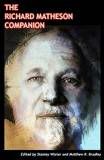 Gauntlet Press / April 2008
Gauntlet Press / April 2008
Reviewed by: JG Faherty
Let’s start off with the most important thing you need to know about this book: it contains a never-before-seen novel (actually, more of a novella) by Richard Matheson. If you’re a fan of Matheson, that’s all I have to say, and you’ll be ordering the book before you reach the next paragraph.
That being said, and assuming you’re back to finish this review, let’s get to the rest of the book.
The Richard Matheson Companion is a book for fans, as we’ve said, but also for those of us who like to know more about a writer than just the names of his stories and novels. You know the type; they’re the ones who buy the various Stephen King companions, or The Science of the X-Files, or all those books that discuss the world of Buffy the Vampire Slayer. They purchase old scripts. They’re the historians of the genre. Sometimes we can’t understand how people can get so immersed in something, and then we take a look around and realize a scary fact:
They are us.
All of us have a subject or a person we want to know more about - everything about. That being said, Richard Matheson was not on my list. I’ve always enjoyed his stories and novels. Like many of the writers who contributed recollections and tributes to this book, I’m of that age where I first heard about him from his movies - for me they were The Incredible Shrinking Man and The Omega Man. When my father told me they were based on books, I had to go to the library and read them.
Then, when I found out he’d written Nightmare at 20,000 Feet, one of my all-time favorite Twilight Zone episodes, I went back to the library and tried to find everything by Matheson that they had. That included Hell House, another great one.
But for me, the name Matheson will always be associated with TV and movies, because he wrote screenplays that I drooled over in my formative years: the two Night Stalker TV movies; Die! Die! My Darling!, Stir of Echoes, Duel, and “Prey” (from Trilogy of Terror).
All in all, I thought I was pretty ‘up’ on Richard Matheson, until I read The Richard Matheson Companion. Forget how cool it is to hear people like F. Paul Wilson, Jack Ketchum, David Morrell, Brian Lumley, and Harlan Ellison talk about Matheson’s writing, or how they found it.
I learned (as so often happens with any factual text), how much I didn’t know about this man. And while I went into this book assuming the tributes would be the veggies and appetizers around the main meal of a new piece of Matheson fiction, it turned out to be the complete opposite.
I’m not going to share the details of each writer’s musings; not only do I hate to be a spoiler, but they were intended to be personal, from writer to reader, and I think each reader should experience them that way. I’ll just say that they ranged from lighthearted and comical to serious and academic; from people having no first-hand relations with Matheson to people who worked closely with him over the years and called him their friend.
Perhaps most interesting of all are the pieces by his children and family - tiny peepholes through which we can see into Matheson’s private life. Little glimpses of a man who we forget was more than just a writer. He was a father, a husband, a businessman. He had flaws and quirks just like the rest of us.
All of this leads up to The Years Stood Still, the ‘new’ Matheson novella written when he was only fourteen. It’s been reproduced faithfully, with typos and grammatical errors intact. It’s the work of a fledgling writer. But what a writer! Check out the first two paragraphs:
The hour of four had barely passed but already it was dark. The skies, sullen all day, hung like a shroud over expectant London. Three times in two days they had been bombed, only the beginning of a huge German campaign to soften up the people of England for the impending invasion.
On Ellen Street all was dark and quiet. The rows of identical tray stone houses that once held the cream of society look up appraisingly at the sky. All were deserted save one which stood in the approximate center of the block. It alone was inhabited and it alone had been struck by bombs.
Fourteen? Fourteen? I’ve read books written today, by adults, who can’t do what Matheson did at an age where my idea of literary accomplishment was doing Star Trek-spoof comics for my friends, comics that relied on fart jokes and Spock’s mating habits for most of their humor.
At fourteen, when most boys spend their time playing baseball and avoiding English homework, Matheson was putting together a piece of work that, with some judicious editing, could knock more than a few of today’s writers off their shelves.
And The Richard Matheson Companion doesn’t end there. You get a complete listing of every screenplay, every story, every book ever written by him, so you can see what you’re missing.
The editors of this book have done a superb job of gathering information. The book won’t be for everyone - some people only want to read fiction; others might not care about what a slew of well-known writers think about a man they consider a friend and/or influence.
But I’d recommend this book to anyone with an interest not only in Richard Matheson, but in the horror, dark fiction, and science fiction genres as well. This man had his literary fingers in a lot of pies.
Pies you just might have taken a bite out of and not realized who the baker was.
Purchase The Richard Matheson Companion edited by Stanley Wiater, Matthew R. Bradley, and Paul Stuve
Limited, numbered editions also available from the publisher.
Hero / Wrath James White and J.F. Gonzalez
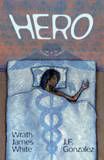 Bloodletting Press / February 2008
Bloodletting Press / February 2008
Reviewed by: Jeff Burk
J.F. Gonzalez (Survivor) and Wrath James White (Book of a Thousand Sins) have been known to traumatize readers with their tales of gore, violence, and the darkest side of human nature. In horror, this is the highest of compliments. Now they have teamed up to write Hero, a story of racism and torture that borrows more than a little from Stephen King's Misery.
Adelle Smith is a former radical civil rights activist who now lives quietly in her urban community. After suffering a particularly debilitating stroke, she is left in need of a full-time caregiver. Enter Natsinet, a nurse who just so happens to be an unrepentant racist and serial killer. Left alone with Adelle, Natsinet uses the opportunity to savagely express her racial hostilities.
The plot touches upon important social and political issues, but never fully breaks away from the story that Stephen King already made famous. Deeper exploration of the racial dynamics of the characters would have greatly enriched the story. The characters talk a lot about race but say very little, their commentary limited to clichéd talking points sprinkled in between scenes of cruelty.
Wrath and Gonzalez have written some of the most squirm-inducing scenes in modern horror fiction, and while Hero contains more than its fair share of violence, it feels oddly restrained. While Adelle undergoes some horrific torture, the reader never truly fears for her fate. Despite the promise of edginess implied by virtue of the book's small press publication, there is nothing in the content that would exclude Hero from a mass-market release.
Hero is far from a bad book, but falls squarely into the category of average. It does not contain the sheer bloodshed and brutality normally found in Wrath James White's works or the engaging characters and unique plots found in J. F. Gonzalez's. The author's meet in the middle on Hero, but it is the wrong meeting point. Avid fans of both authors and those who like their horror nice and pulpy will enjoy this book. It’s just frustrating that two powerhouse authors do not deliver the thoughtful, soul-crushing book one knows they could have.
Purchase Hero by Wrath James White and J.F. Gonzalez.




